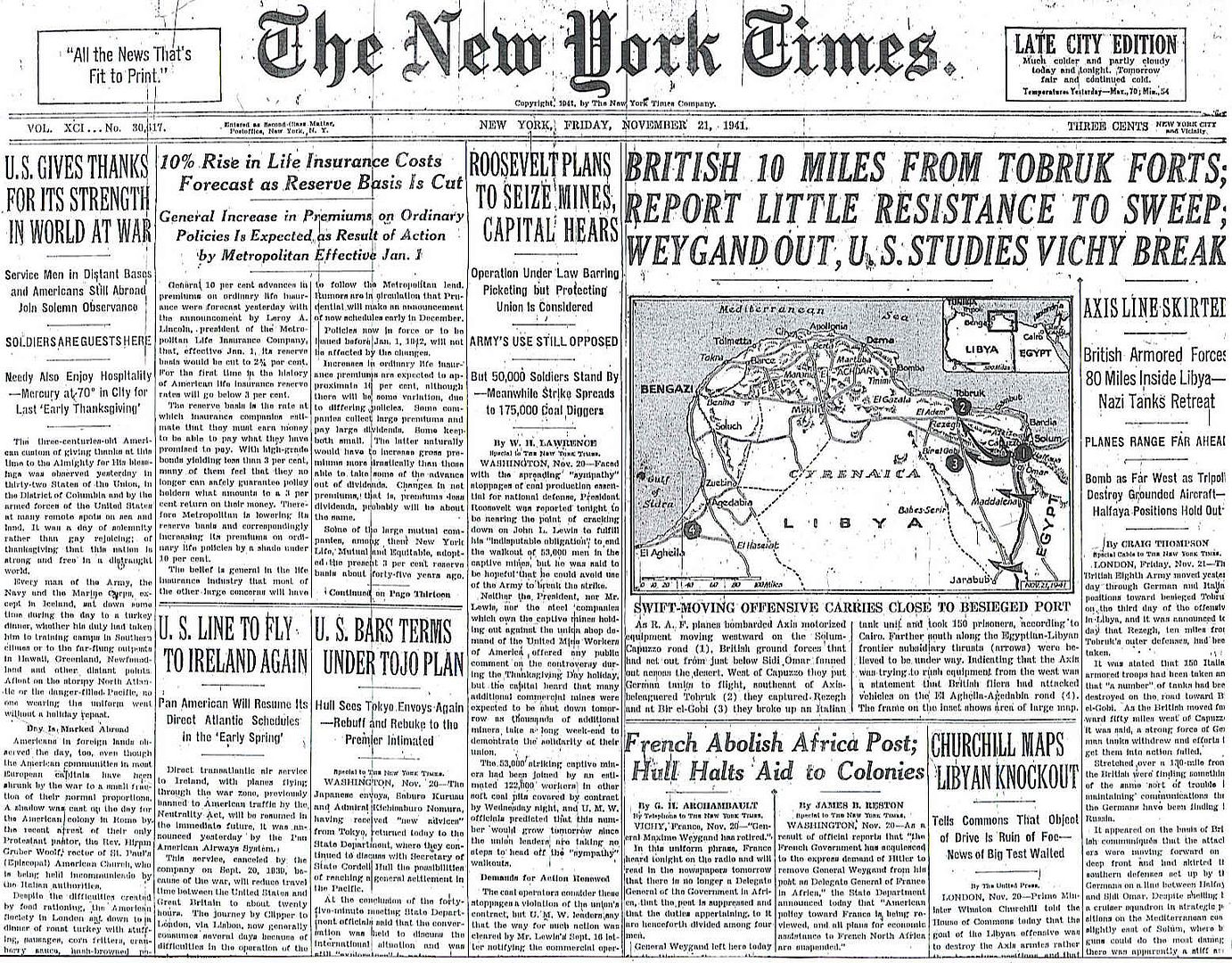
Posted on 11/21/2011 4:30:33 AM PST by Homer_J_Simpson

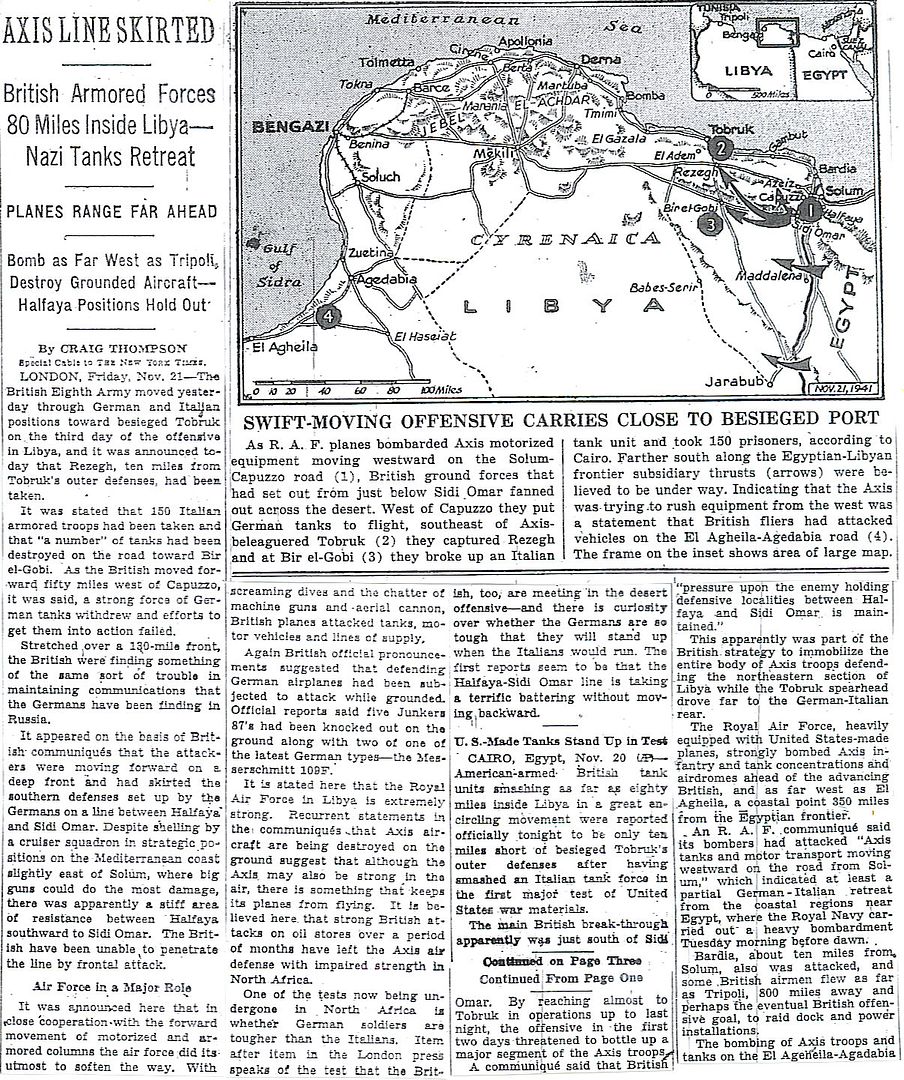
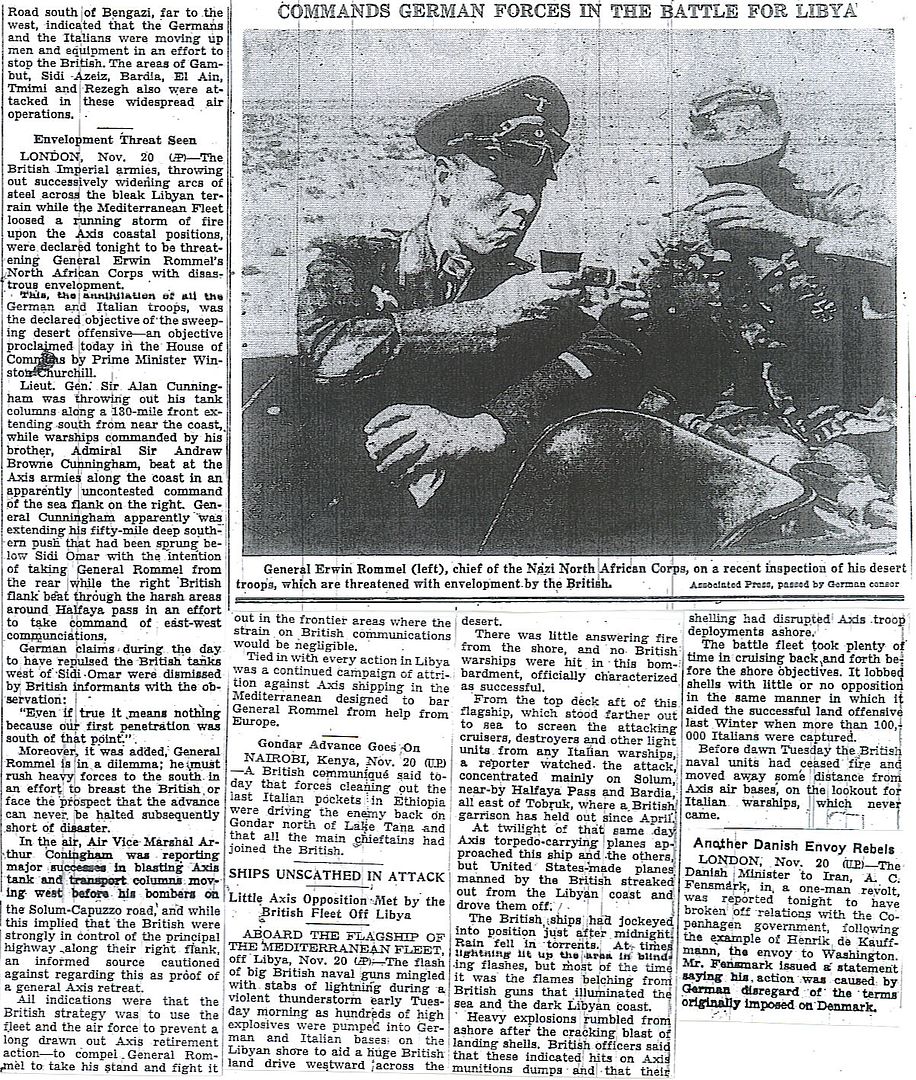
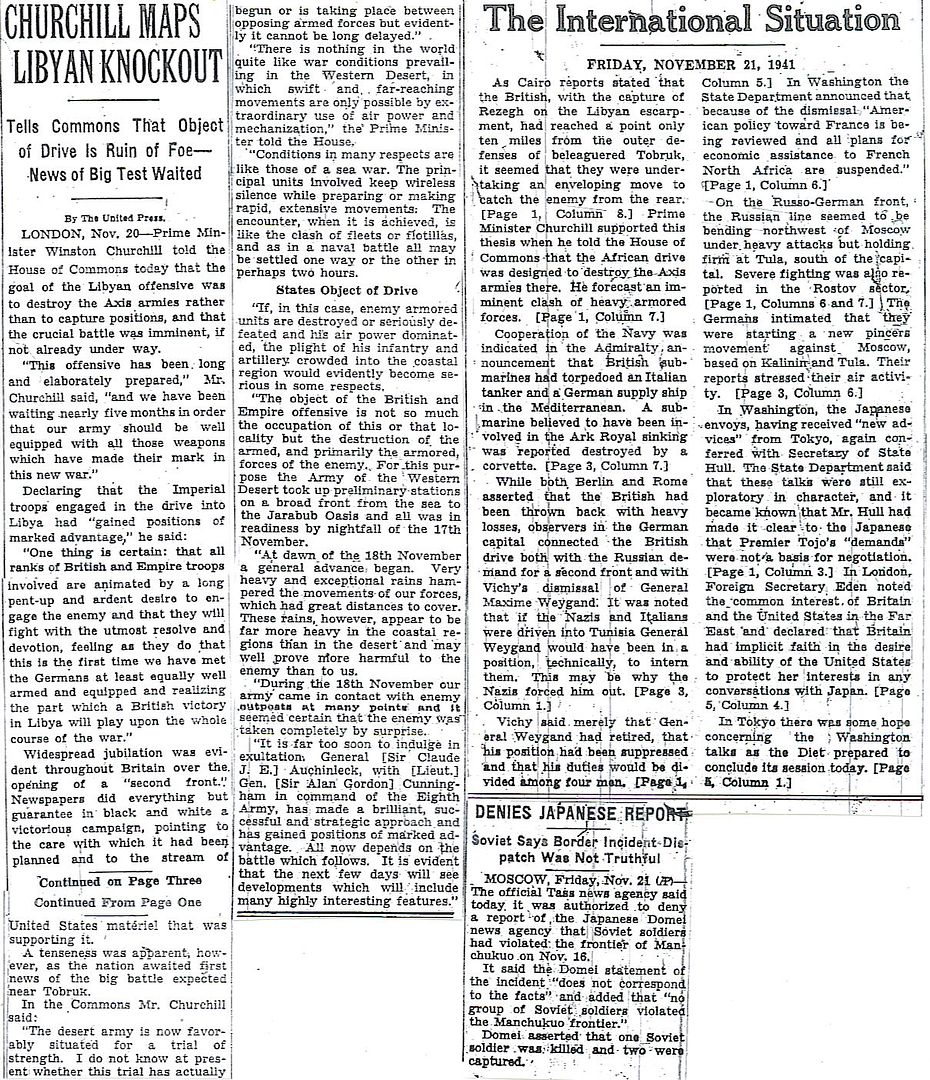
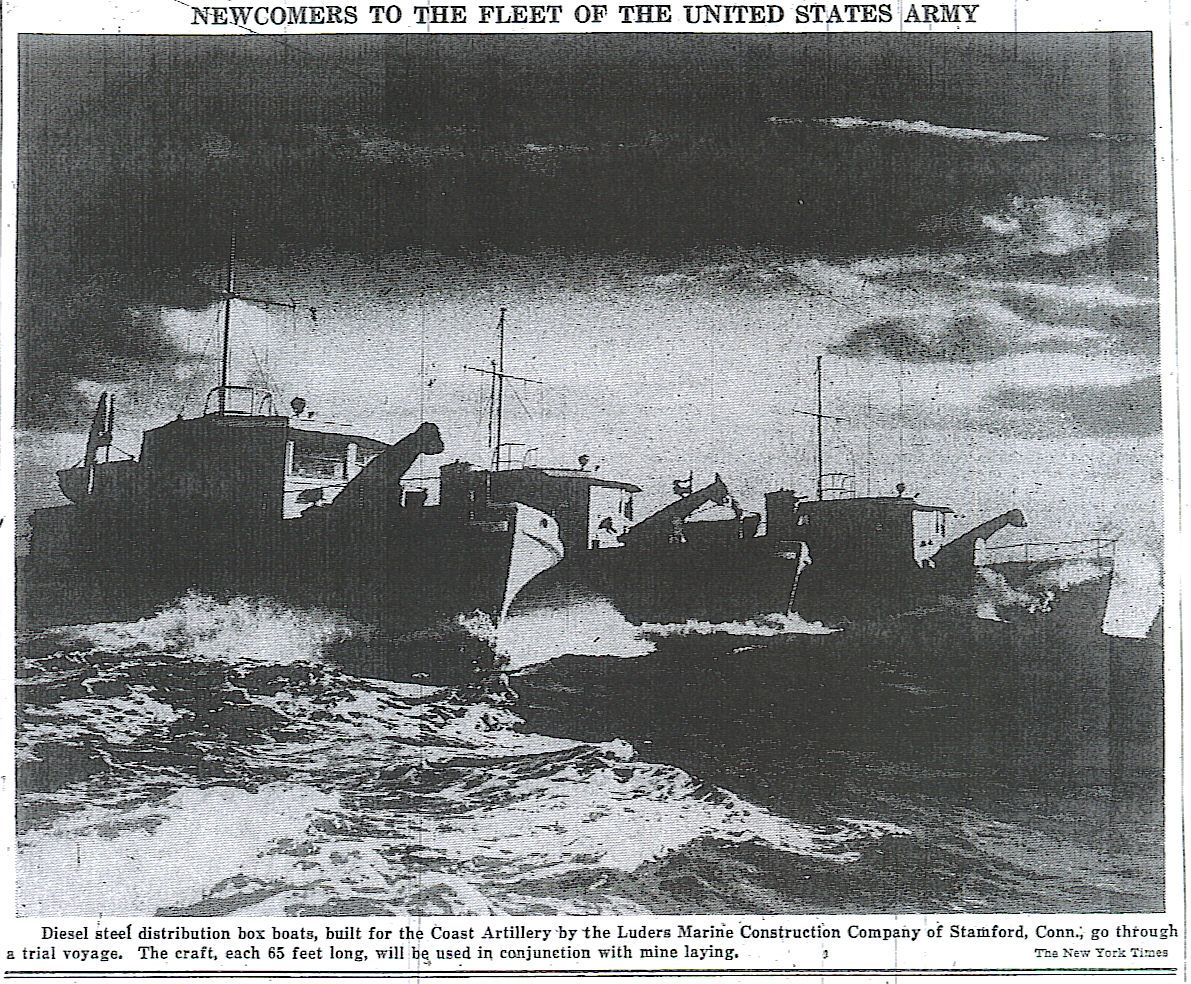
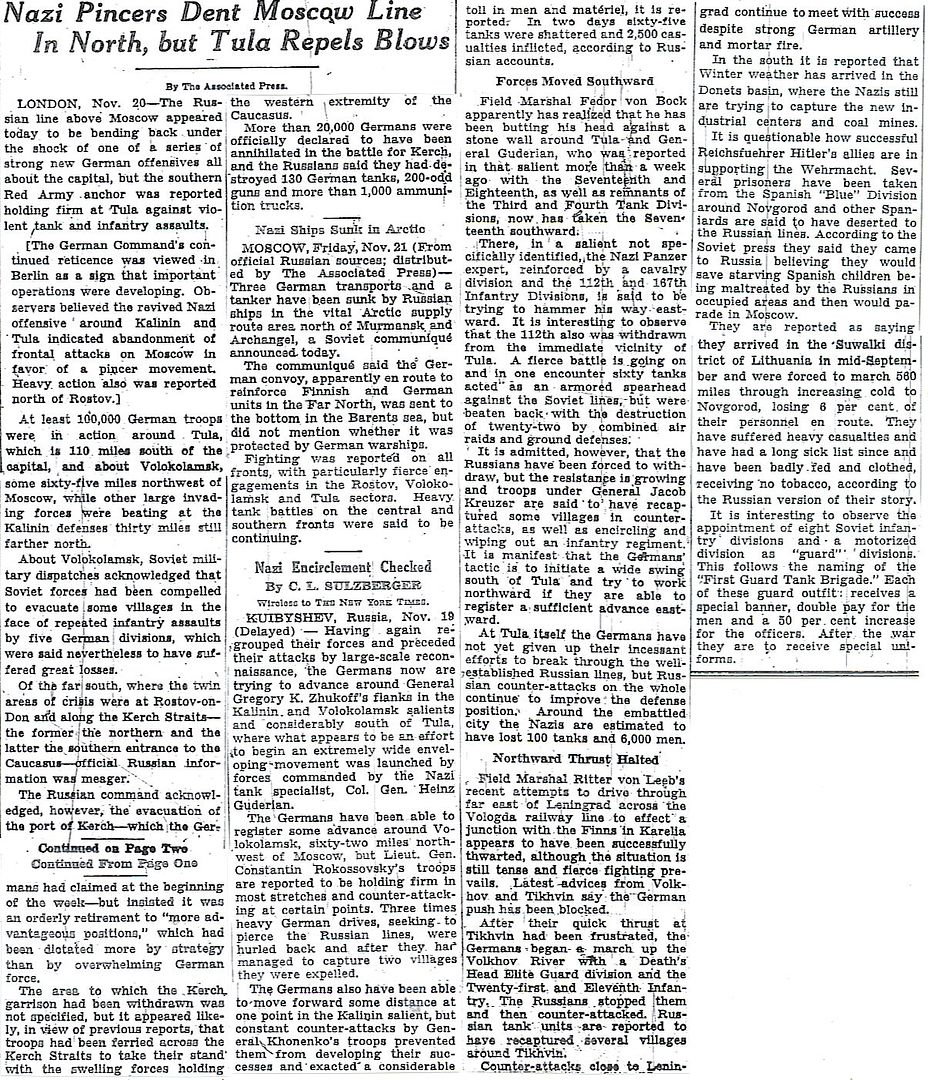
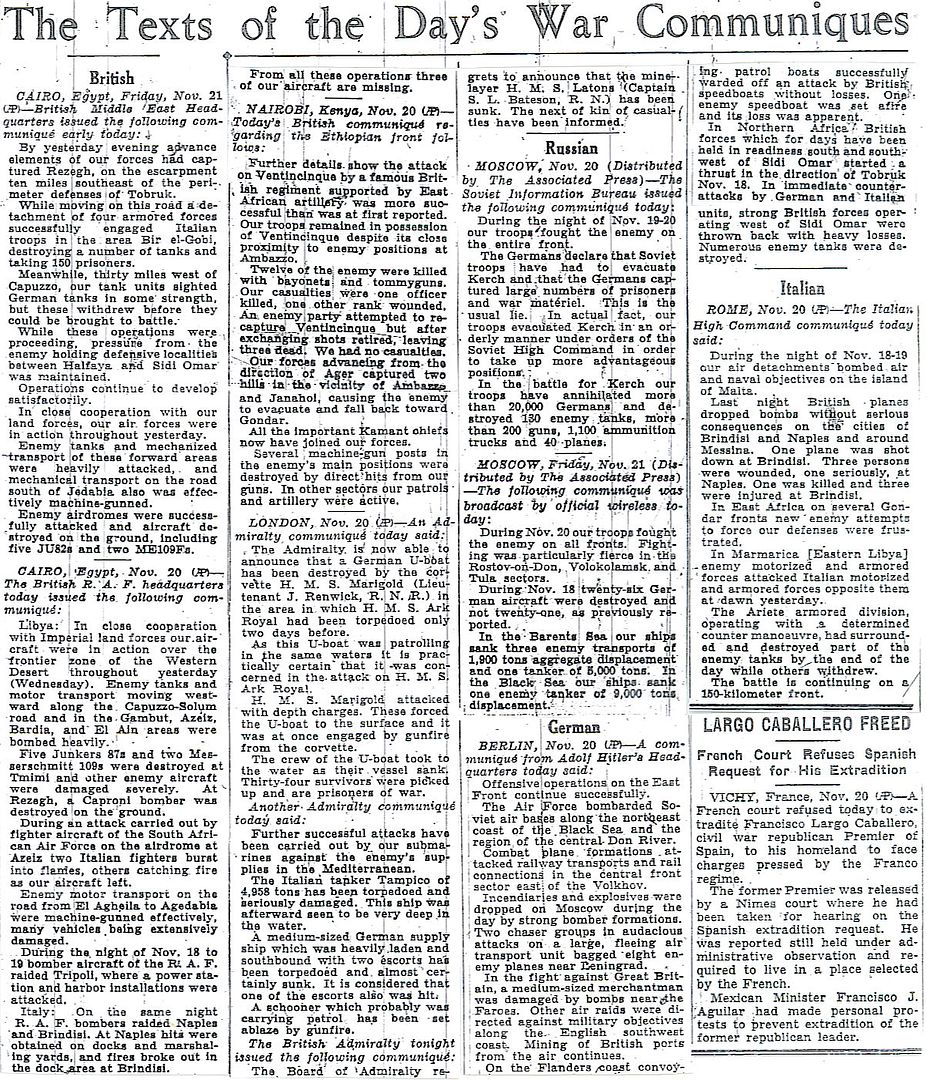
http://www.onwar.com/chrono/1941/nov41/f21nov41.htm
Germans capture Rostov
Friday, November 21, 1941 www.onwar.com
On the Eastern Front... Rostov falls to German forces after a fierce battle with Soviet troops.
In North Africa... Rommel orders an attack on the British 7th Armoured Brigade at Sidi Rezegh by both German panzer divisions. By days end, 20 tanks remain to the British brigade. A breakout attempt at Tobruk is halted when expected help from the 7th Armoured Brigade does not arrive. The British respond by moving the 4th and 22nd Armoured Brigades toward Sidi Rezegh.
In East Africa... The Allied and local forces renew their attack on Kulkaber and after heavy fighting the Italians surrender. The Italian presence in Abyssinia is now confined to the area immediately around Gondar.
In the Mediterranean... Supply convoys to north Africa are increasing because of the growing supply problems there. Two of the Italian cruisers are badly damaged, however searches by British Malta naval forces do not find them.
http://homepage.ntlworld.com/andrew.etherington/month/thismonth/21.htm
November 21st, 1941
GERMANY: Albert Speer, Chancellor Adolf Hitler’s chief architect and minister for armaments and war production, asks for 30,000 Soviet prisoners of war to use as slave labourers to begin a massive Berlin building program. These slave labourers will come in handy for Hitler’s “new” Berlin. Speer wants to begin construction even as the war wages. Despite the drain on resources Hitler agrees. Speer beguiles the Fuhrer with models of a Great Hall for the Chancellery and a grand office for Goring. But as the war turns against Germany, the rebuilding plans are scrapped. When the war is over, Hitler is dead, and Speer is tried as a war criminal at Nuremberg, the site of his grand parade, and sentenced to 20 years in Spandau prison in Berlin. (Jack McKillop)
One of Germany’s leading air aces, Oberst (Colonel) Werner Mölders, is killed when the plane, an HE-111 bomber in which he is a passenger, hits a factory chimney in fog and rain near Breslau, while on his way to the state funeral of General Ernst Udet, Chief Air Inspector General of the Luftwaffe who committed suicide on 17 November. Mölders, who has achieved 115 kills, 68 of which were achieved in the western theatre, is replaced by the fighter ace Adolf Galland (103 kills) who retains the post until January, 1945. (Jack McKillop)
U.S.S.R.: The news from all along the front is of furious assaults and desperate Russian resistance. In the south Rostov-on-Don has been captured by von Kleist’s panzers, although the Red Army is regrouping in an attempt to reclaim the battered city. In the north the siege of Leningrad is biting hard. Despite an airborne evacuation there are still too many mouths to feed, and the Germans have cut the communications centre of Tikhvin, 120 miles to the east.
Tula is still holding out, blocking Guderian’s way to Moscow. Although the Germans are making some progress north of the city, the Russians are fighting with great tenacity. A Siberian division armed with T-34tanks has also joined the battle near Venev, 60 miles south of Moscow. The fortress of Sebastopol, the last Russian stronghold in the Crimea following the German breakthrough into the peninsula, has also fought off all attempts to penetrate its defences. It is becoming the Russian Tobruk.
NORTH AFRICA: The British 7th Armoured Division is caught by the Germans at Sidi Rezegh. The 4th and 22nd Armored Brigades are not there yet. The breakout attempts from Tobruk are halted.
New Zealand forces crossing the border from Egypt, capture Fort Capuzzo.
LIBYA: Rifleman John Beeley (b.1918), King’s Royal Rifle Corps, left his company on his own initiative and cleared three gun positions before being killed. (Victoria Cross)
Brigadier John Charles Campbell (1894-1942), Royal Horse Artillery, showed brilliant leadership under heavy fire, manning guns himself and refusing evacuation when wounded. (Victoria Cross) (More...)
2nd Lt. George Ward Gunn (b.1912) Royal Horse Artillery, led four anti-tank guns facing 60 tanks; when three were knocked out he fired the fourth himself until he was killed. (Victoria Cross)
ETHIOPIA: Allied attacks on Kulkaber, SE of Gondar begin again. The Italians give stout resistance before surrendering. Gonar remains held by the Italians.
JAPAN: The Foreign Ministry sends the following message to the Japanese Embassy in Berlin, German: “At present, the possibility of peace between Germany and the Soviet Union seems remote. However, it may be that Germany would prefer to avoid being faced with a long term resistance by the U.S.S.R., so that she-Germany-may transfer her entire fighting forces to some other part. On the Soviet side, it seems possible that sentiment for peace may develop when she views the situation from the standpoint of reconstruction. Our relations with the United States may have considerable effect on our southward program, depending, of course, on what turns those relations take. In other words, our relationship with Great Britain and the United States has a great bearing on the future of our national greatness. For this reason, we would like to avoid the rise of any violence at this time. At the same time, we would like to break up the policy of British-U.S.-U.S.S.R. joint action. We would, therefore, welcome, if anything, peace between Germany and the Soviet Union. For the purpose of enhancing our position, we would not be opposed to mediating in a peace, if such a course is possible. Will you, therefore, bearing the above in mind, keep an eye on developments.” (Jack McKillop)
The four submarines of the 1st Submarine Unit, Advance Group, Pearl Harbor Strike Force, depart Kure today. Each submarine is carrying a b Glenb seaplane (Kugisho E14Y1, Navy Type 0 Small Reconnaissance Seaplane). On 7 December, these four submarines will be stationed about 70 nautical miles (130 kilometers) north of Oahu, Hawaiian Islands.
COMMONWEALTH OF THE PHILIPPINES: Marshall advises MacArthur that Rainbow-5 had been modified to “include ... strong air operations” and authorizing offensive operations; WPO-3 had been suspended. (Received in the Philippines November 22, 1941)
MacArthur ordered B-17’s removed from Clark Field near Manila to Del Monte Field in Mindanao to remove them from the striking range of Japanese aircraft. Brereton reported the aircraft will be moved but this is delayed due to construction at Del Monte and only 17 (some sources say 16 or 18) aircraft were actually moved by the time War breaks out.
FEAF plan submitted to Sutherland, who opposed the movement of the B-17’s to Mindanao. Persistence of FEAF Chief of Staff, Colonel Francis M Brady, swayed Sutherland and he agreed to a temporary shift of these airplanes to the south.
The Provisional Tank Group of the 17th Ordnance Company, US Army, is formed today under Col. (later Brig-Gen) James R. N. Weaver. It comprises of the 192nd Tank Battalion with four companies utilized 54 tanks, with 36 officers and 552 enlisted men, and the 194th Tank Battalion with three companies utilizing 54 tanks, 36 officers and 374 enlisted men. All the tanks are M3’s. (Marc Small)
The commander of the 5th Air Base Group reports to FEAF HQ and is told that his unit will be based at Clark Field. He went up to Clark and upon returning, was told to report to Colonel George who asked him to go to Del Monte Field to get it operational. But George warned him that “there were no facilities at all – no hangars, no barrack, no supplies, no nothing.” Within three days, two small interisland steamers had been acquired and the men and supplies were sailing the 800-miles (1287 kilometres) to Mindanao. Several days later, the two steamers arrived ant the men and supplies were unloaded and transferred 18 miles (29 kilometres) to the field.(Jack McKillop)
CANADA: Patrol vessel (ex-fishing vessel) HMCS Kuitan commissioned. (Dave Shirlaw)
U.S.A.: Battleship USS INDIANA is launched.
Washington: The Roosevelt administration has rejected the latest proposals put forward by Saburo Kurusu, Japan’s special envoy. The secretary of state, Cordell Hull, says that US acceptance would be tantamount to “aiding and abetting Japan in her efforts to create a Japanese hegemony in and over the western Pacific.” Hopes of averting war have been weakened by Japan’s warning that time for negotiations is limited.
New proposals from Japan’s premier, Hideki Tojo, rule out the use of force by both sides and offer withdrawal from southern Indochina to the northern part of the country. In return Tokyo wants the USA to lift its oil embargo, supply Japan with one million tons of aviation fuel each month and help it to acquire whatever oil it needs from the Dutch East Indies.
Relationships between the two countries have been strained since July when the US and Britain imposed an effective oil embargo in retaliation for the Japanese invasion of Indochina. Japan imports 88% of its oil and is estimated to have enough for three years - or 18 months if it goes to war.
The United States agreed to pay Iceland for fish and oil sent to Britain. (Dave Shirlaw)
The Navy Department sends the following message to the Commanders of the Asiatic and Pacific Fleets. “Have been informed by Dutch Legation that they have received a dispatch as follows: “According to information received by the Governor General of The Netherlands East Indies a Japanese expeditionary force has arrived in the vicinity of Palau. Should this force, strong enough to form a threat for The Netherlands Indies or Portuguese Timor, move beyond a line between the following points Davao (Philippine Islands) Waigeo (Island, Netherlands East Indies) Equator the Governor General will regard this as an act of aggression and will under those circumstances consider the hostilities opened and act accordingly.” Inform Army authorities of foregoing. Request any information you may have concerning development of this Japanese threat against the Dutch East Indies and your evaluation of foregoing information.” (Jack McKillop)
ICELAND: U.S. Lend-Lease is extended to Iceland. (Jack McKillop)
germans losing in front of moscow in the snow, and in North Africa.
Japan about to buy in at the top by attacking the US.
You have to admit that once the US embargoed oil and avgas, war was a certainty. Been fascinated to read about that decision which essentially was about the US insistince that Japan pull out of China.
so basically we went to war with Japan over China. Of course the irony is that after the war China became a major enemy and went communist so in retrospect we didnt really accomplish the real reaosn we went to war.
We did though pull Japan into our economic sphere where it was our major partner for 50 years so that was also an unintended consequence.
Funny how no one on either side in WW2 got what they thought they would from the war.
England went to war to protect Poland from domination, but it ended up dominated and Russian.
Germany and Japan obviously had a different than planned outcome.
I gues the only real winner was the US which dominated the world from pretty much 1945 to recently.
I believe it was Molders, while flying with the Condor Legion in spain, who devised the so-called finger four fighter formation [two pairs of wingmen] still in use today.
That's a bit of a generalization but I can see where you are coming from.
It's important to realize though that China was a different animal as far as the nations involved in the Second World War are concerned.
First of all, China was the only major country in WWII that was divided into spheres of influence and had been long before this war. This really dates back to the Opium and Arrow Wars, but there had been an expansion in this leading up to the Boxer War at the beginning of the 20th century in which seven western counties (Japan, and the United States included) fought both the Boxers and the Qing's Army. The Qing, the last dynastic power in China, collapsed in 1911 and by World War I fighting in that theater was about these spheres of influence and not about any Chinese nationalistic fervor. Japan invaded Shangdong province and took Qingdao (or Tsingtao if you are a beer connoisseur) which was the German sphere of influence in China at that time. The Chinese had hoped that they would be able to win back this province at the Paris Peace Conference, but the Japanese exerted enough influence at the conference to keep the issue off the table. The Chinese protested by refusing to sign the Treaty of Versailles, the only member nation at the peace conference to do so (in fact they didn't even show up at the signing ceremony). It would not be until the Washington Conference, most widely known for its naval aspects, that Japan would give Shangdong back to the fledgling Chinese government.
All the while, as these spheres of influence continued to influence Chinese politics and nationalism, the United States was still pressing for the fiction of an "Open Door" policy in China. So the Japanese expansionism in China did play a roll in the U.S. reaction to Japanese imperialism to a degree.
However, it was more an issue of the balance of power in the entire region that was a primary motivator. Notice that the embargoes of 1940 and 1941 are not related to China at all, but to Annam (French Indochina). China by this time has pretty much been reduced to skirmishing and though there are efforts being made to aid the Nationalist government, it is a drop in the bucket, and the effect is insignificant. (An interesting side note, did you know that Lend-Lease aid to China was the only Lend-Lease aid that was not provided directly to the recipient government instead being controlled by the American aid in theater, like General Joe Stilwell).
Indochina however, creates a whole new problem with the balance of power in the South Pacific. Now we have Japanese expansionism directly threatening Western colonial possessions. The Dutch East Indies, Singapore, Hong Kong, the Philippines are all now in the line of fire of the Japanese. This was a larger issue than that of the Nationalist's struggle for control in China (meanwhile the CCP is slowly growing in the north to become a problem for the Nationalists down the road). While the official American position is one of anti-colonialism, these areas, especially the DEI are still trading partners and as Alfred Mahan would say, these lines of communication must be maintained.
It's hard to say really. Charles Chennault was experimenting with double-plane and triple-plane formations back in 1929. One configuration consisted of two sets of the double-plane formation which was identical to the fingers four. A formation that good is likely to be developed by many independent from each other.
Of course, the Japanese could have chosen to get the materials peacefully.
but the real problem remained the army in china, and the inability of either the Navy or the civilian government to control the army much. the army was paralyzed by what they called “debt to the dead” meaning by that time they had lost 200,000 troops and couldn't pull out with nothing just because the US said so. so the US presented a basically unsolvable problem to the Japanese, pull out of china, which they couldn't do, or shut down the country in two years or less for lack of oil and materials.
its for this reason i have to feel that the US was a party to the drive to war, and that war was the predictable outcome.
Certainly, but that was more a product of the fact that this is where Japanese aggression was centered initially than being about China itself. When Japan made moves on China in the late 1800s, the U.S. was less interested in it than they would be once Japan really became a legitimate power in the region.
You do not see much of an American response when the assassination of Kim Ok-kyun along with the Tonghak Insurrection triggered the Sino-Japanese War in 1894. This fight against the Qing would lead to the Japanese taking over the Korean peninsula along with a chunk of Manchuria (the Manchurian district would be given back after the war at the behest of the French, Germans and Russians). The United States only response to any of this was to declare the "Open Door" policy in 1898.
Even when the Japanese invaded Manchuria in 1931, there was not much of an American response. It wasn't until the Japanese expansion began to pose a threat to western European ligations that the U.S. started to take an interest in Japanese aggression in China. Up until Lend-Lease started supplying the Chinese, the Soviets were the largest suppliers of arms and advisers to the Nationalists (this started to dry up in late 1939 and disappeared completely once Germany invaded the Soviet Union).
I'm not saying that the U.S. didn't support the Nationalist's cause, but I can't say that Jiang Jieshi was the primary reason the U.S. began to oppose Japanese expansionism in the Pacific.
Disclaimer: Opinions posted on Free Republic are those of the individual posters and do not necessarily represent the opinion of Free Republic or its management. All materials posted herein are protected by copyright law and the exemption for fair use of copyrighted works.